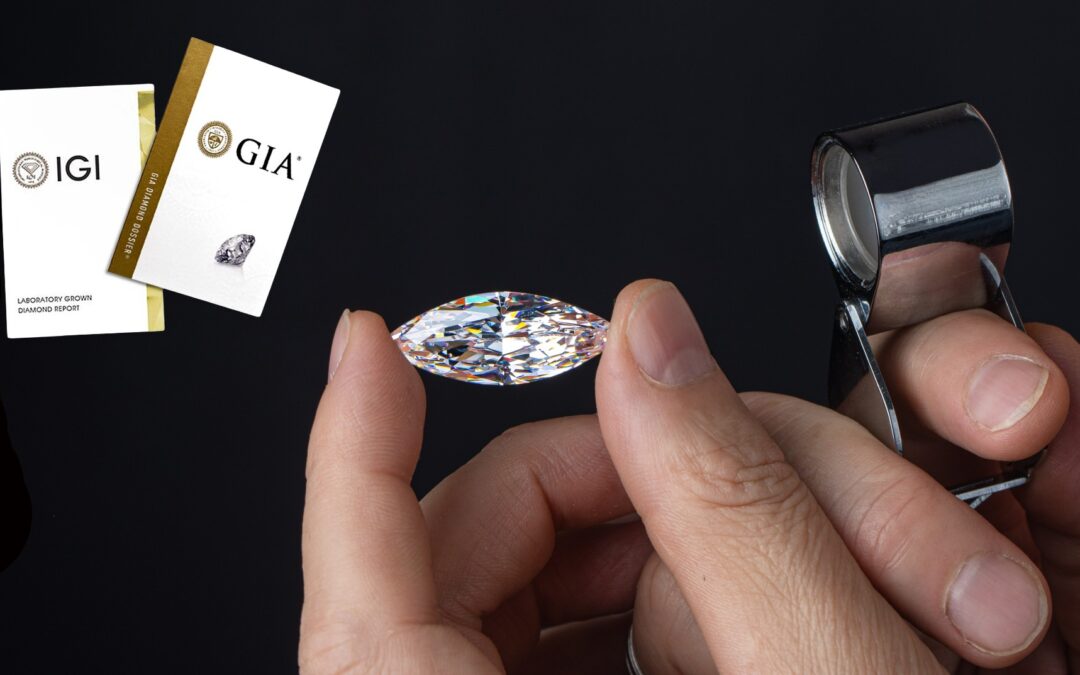At Diamond Exchange Houston, we understand that purchasing diamonds and fine jewelry is a significant investment. To ensure our customers make informed decisions, we emphasize the importance of diamond certifications and appraisals. This article aims to clarify the distinctions between these two critical documents, the types of certificates available, and answer common questions our customers frequently ask.
What Is a diamond certificate, and how does it differ from a jewelry appraisal?
A diamond certificate (also known as a grading report) is an unbiased assessment of a diamond’s characteristics performed by a reputable gemological laboratory. It provides detailed information about the diamond’s cut, color, clarity, carat weight, and other measurements.
On the other hand, a jewelry appraisal is an estimate of the diamond’s market value conducted by a qualified appraiser. While a certificate focuses on the diamond’s physical attributes, an appraisal considers current market conditions and the overall craftsmanship of the jewelry piece.
Different types of certificates
Several gemological institutes issue diamond certificates, but the most recognized and respected ones include:
- GIA (Gemological Institute of America): Known for its stringent grading standards, a GIA certificate is highly regarded in the industry.
- AGS (American Gem Society): Renowned for its focus on cut quality, AGS reports provide a comprehensive evaluation of a diamond’s performance.
- IGI (International Gemological Institute): Offers reliable grading reports and is particularly popular in Europe and Asia.
- EGL (European Gemological Laboratory): Provides detailed diamond reports, but standards can vary by region.
Difference between certificates (Grading Reports) and appraisals
- Certificates (Grading Reports): Issued by gemological laboratories, these reports objectively detail a diamond’s characteristics without assigning a monetary value.
- Appraisals: Conducted by qualified appraisers, these documents provide a monetary value based on current market conditions, considering both the diamond and the setting.
FAQs about diamond certifications and appraisals
What information Is included in a diamond certificate?
diamond certificate typically includes the following information:
- Carat Weight: The diamond’s weight measured in carats.
- Cut: An assessment of how well the diamond is cut, affecting its brilliance and sparkle.
- Color: The diamond’s color grade, indicating the absence of color.
- Clarity: An evaluation of the diamond’s internal and external flaws.
- Measurements: The diamond’s dimensions, including diameter, table, and depth.
- Proportions: Details about the diamond’s symmetry and polish.
What Does a jewelry appraisal cover?
A jewelry appraisal provides a comprehensive assessment of the piece’s value, including:
- Diamond and Gemstone Details: Information about the diamonds and other gemstones in the piece.
- Metal Type and Quality: Details about the metal used in the setting.
- Craftsmanship: Evaluation of the jewelry’s design and construction quality.
- Market Value: The current market value based on comparable sales and market trends.
Who issues diamond certificates, and are all certificates equal in value?
Diamond certificates are issued by reputable gemological laboratories such as GIA, AGS, IGI, and EGL. Not all certificates are equal; some laboratories have stricter grading standards and are more widely recognized. A GIA certificate, for example, is often considered the gold standard due to its rigorous grading process.
Why do I need a diamond certificate?
A diamond certificate provides assurance about the diamond’s quality and authenticity. It allows you to compare diamonds objectively and ensures you are paying a fair price based on the diamond’s characteristics.
When Is a jewelry appraisal necessary?
A jewelry appraisal is necessary for:
- Insurance Purposes: To determine the replacement value in case of loss, theft, or damage.
- Resale: To establish a fair market value when selling the piece.
- Estate Planning: To accurately value jewelry for inheritance and estate purposes.
How often should I get my jewelry appraised?
It is recommended to get your jewelry appraised every 2-3 years. This ensures that the appraisal reflects current market conditions and any changes in the value of the diamonds and metals.
Can I trust all appraisers?
It is essential to choose a qualified and reputable appraiser. It is best look for appraisers who are certified GIA Graduate Gemologists. If you eventually plan to get insurance on your jewelry, most insurance companies want the appraiser to be a GIA graduate gemologist. If you are going to get an appraisal you definitely want the appraiser to be a 3rd party. You do not want the jeweler who is selling you the jewelry to mark his own report card.
How do I read a diamond certificate?
Understanding a diamond certificate involves familiarizing yourself with the grading terms and scales used by the gemological laboratory. Our staff at Diamond Exchange Houston can help explain the details and answer any questions you may have about your certificate.
What should I bring to a jewelry appraisal?
When getting a jewelry appraisal, bring any existing certificates, previous appraisals, purchase receipts, and any other relevant documentation. This information helps the appraiser provide a more accurate valuation.
By including detailed and accurate information about diamond certifications and appraisals, we aim to ensure our customers feel confident and informed in their purchases. If you have any further questions, our knowledgeable staff is always here to help. Visit our store or explore our website at Diamond Exchange Houston to learn more about our extensive selection of certified diamonds and fine jewelry.


